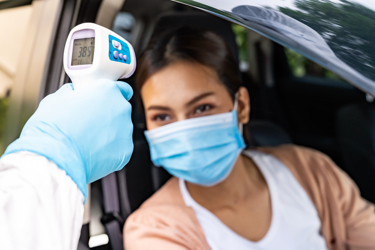Clinical Logistics: Keeping COVID-19 Vaccine, Therapeutic Dev On The Rails

By Matthew Pillar, Editor, Bioprocess Online

With a direct impact on timelines and data quality, transportation for clinical trials patients can make or break in-human studies. The challenge is on full display as hundreds of biopharmas continue their furious development of COVID-19 vaccines and therapeutics.
A couple of huge, coordinated public/private partnerships in the battle to thwart the COVID-19 pandemic have shone a spotlight on the logistical challenges associated with conducting clinical trials. The ACTIV-2 program is a study for outpatients with COVID-19 that’s coordinated and funded by the National Institutes of Health. This program, and the COVID-19 Prevention Network (CoVPN) formed by the National Institute of Allergy and Infectious Diseases (NIAID), are the two leading entities in the search for new COVID-19 vaccines and therapies. Collectively, they operate more than 150 clinical trial sites nationwide, where patient data that’s critical to the development of COVID-19 vaccines and therapeutics is collected.
Despite the direct support of Operation Warp Speed and the NIH, this massive clinical exercise has struggled with the same mighty challenges faced by clinical-stage biopharmas large and small, namely, patient recruitment, attrition, and diversity. To optimize clinical trials efficiency, maximize patient value, and, ultimately, improve efficacy in disparate patient populations, each of these challenges is incredibly important to address. Clinical trials recruitment, attrition, and diversity failures also share a common culprit: patient logistics.
This clinical trial logistics conundrum has been particularly pointed in the age of COVID-19. It’s difficult to recruit and maintain patients who are advised, or even mandated, not to travel. The challenge doesn’t discriminate between rural populations, where patients might have to travel great distances for treatment, and urban populations, where public transportation-dependent patients might be homebound due to bus and train closures or social distancing concerns.
The ACTIV-2 and CoVPN programs, born of the pandemic itself, know these problems all too well. In the face of lockdowns and travel restrictions designed to thwart the very disease they desperately needed patient participation to study, the organizations sought a safe mode of transportation to ferry patients to and from those 150 trial sites across the country. Options that might have seemed obvious before the pandemic were off the table. Uber, for instance, which partners with Ride Health’s healthcare provider division, wants no part of the COVID-19 patient initiative. Rightly so, the company subscribes to the CDC directive that people diagnosed with COVID-19, those who suspect they may have it, and those being evaluated for it should not use rideshare services, public transportation, or taxis. Neither could traditional EMS services fill the gap. The sheer volume of COVID-19-realted trial participants would overwhelm their resources.
As such, the ACTIV-2 and CoVPN programs struggled to find a company willing to accept the large-scale and risky task. Then, they found a little-known New York-based digital health startup called Ride Health. The company was founded by Imran Cronk, who hatched the idea after giving a discharged patient with no means of transport but his feet a ten-mile drive home from a hospital.
Rooted In Healthcare, Expanding To Life Sciences

“That’s when we really realized the scale that a service like Ride Health could achieve in life sciences,” says Farhoomand. Back in March 2020, the company entered into an agreement with the CoVPN to make transport available for vaccine efficacy trials, as well as for participants in the antibody cocktail and monoclonal antibody therapeutic trials conducted by Regeneron and Eli Lilly, respectively. To win the deal, Ride Health mobilized hundreds of rideshare operators and oversaw the adoption of and adherence to CDC guidelines—from face coverings to dividers between the front and back seats to pre-and post-ride disinfectant and cleaning protocol—among them all.
“Recognizing the importance of patient recruitment and retention in the effort to rapidly develop COVID-19 vaccines and therapeutics, we were more recently selected by ACTIV-2 as the sole coordinator of rides for trial participants in all 50 states,” says Farhoomand. The deal builds on the company’s mission to expand clinical trials inclusion and access, a mission that Farhoomand, a scientist by training, shares. “Our service enables trials participation by every demographic in the country, including people in rural areas and socially disadvantaged urban areas. Unfettered inclusion improves outcomes by providing scientists with more and better data to help them understand how vaccines and medications affect populations on the whole,” he says. The service leverages a pool of the estimated 70,000 independent, local transport providers across the country, opening access to populations of people who had no previous access to clinical trial participation.
Beyond the immediate response to COVID-19, Farhoomand says Ride Health intends to build on its clinical trial logistics support service to help biopharmas large and small improve trial outcomes. “Clinical trial studies operate on tight timelines, so patient attrition can equate to significant time and monetary setbacks,” he says. Attrition is often associated with the challenge of patient transport, an issue that’s often unanticipated by emerging biopharmas entering clinical studies for the first time.
Learn more about Ride Health’s life sciences offerings here.

